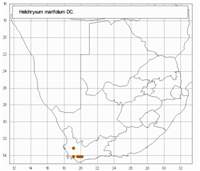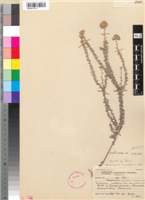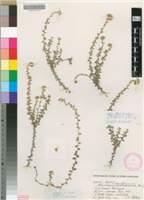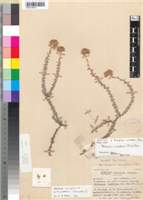Origin of name:
mari = seafolium = leaves
Diagnostic characters:
Small roundish leaves, very woolly-hairyFew flower heads in clustersBracts very woolly-hairy
Description:
Perennial herb, stems diffuse, probably trailing, branched, grey woolly-felted, closely leafy except near the heads. Leaves spreading or reflexed, mostly 5-7 (-12) x 2.5-4 (-6) mm, diminishing in size and more distant near the heads, narrowly ovate, apex subacute, mucronate, base broad, half-clasping, both surfaces greyish-white woolly-felted. Heads heterogamous, campanulate, c. 4-5 x 4 mm, up to c. 12 in congested, rounded terminal clusters. Involucral bracts in 4-5 series, graded, imbricate, inner about equaling flowers, not radiating, lanceolate to oblong, straw-coloured, tips acute to obtuse, often dark, whole bract densely villous dorsally. Receptacle smooth. Flowers 15-20, 5 female, 10-15 homogamous. Achenes not seen, ovaries with duplex hairs, not mucilaginous when wet. Pappus bristles many, shaft barbellate, becoming shortly plumose upwards, bases cohering by patent cilia.
Flowering in September and October.
Distribution:
Recorded only from the Riviersonderend Mountains, in Caledon division of the SW Cape, on steep S slopes and cliffs, in kloofs, and along cliffed river banks.
Fynbos Biome.
Notes:
Closely allied to H. capense but distinguished by its differently shaped leaves, often much smaller than those of H. capense.
Taxonomy:
Literature:
Helichrysum marifolium DC., Prodr. 6: 186 (1838).
Type:
Cape, Swellendam distr., mountains near Puspasvalei, Voormansbosch, Duivelsbosch and at Keurbooms River, 1000�4000 ft., Oct., Ecklon 195 (G-DC, holo.; M, iso.).
Synonym(s):
Gnaphalium marifolium (DC.) Sch. Bip. in Bot. Ztg 3: 171 (1845).
Eriosphaera umbellata Turcz. in Bull. Soc. Nat. Moscow 24, 2: 79 (1851). Helichrysum umbellatum (Turcz.) Harv. in F.C. 3: 230 (1865). Type: Cape, River Zonder Einde, Zeyher 2891 (K; PRE; S; SAM; TCD, iso.).
Vouchers:
Esterhuysen 32719A (BOL); Stokoe SAM 57557 (NBG; PRE; SAM).



